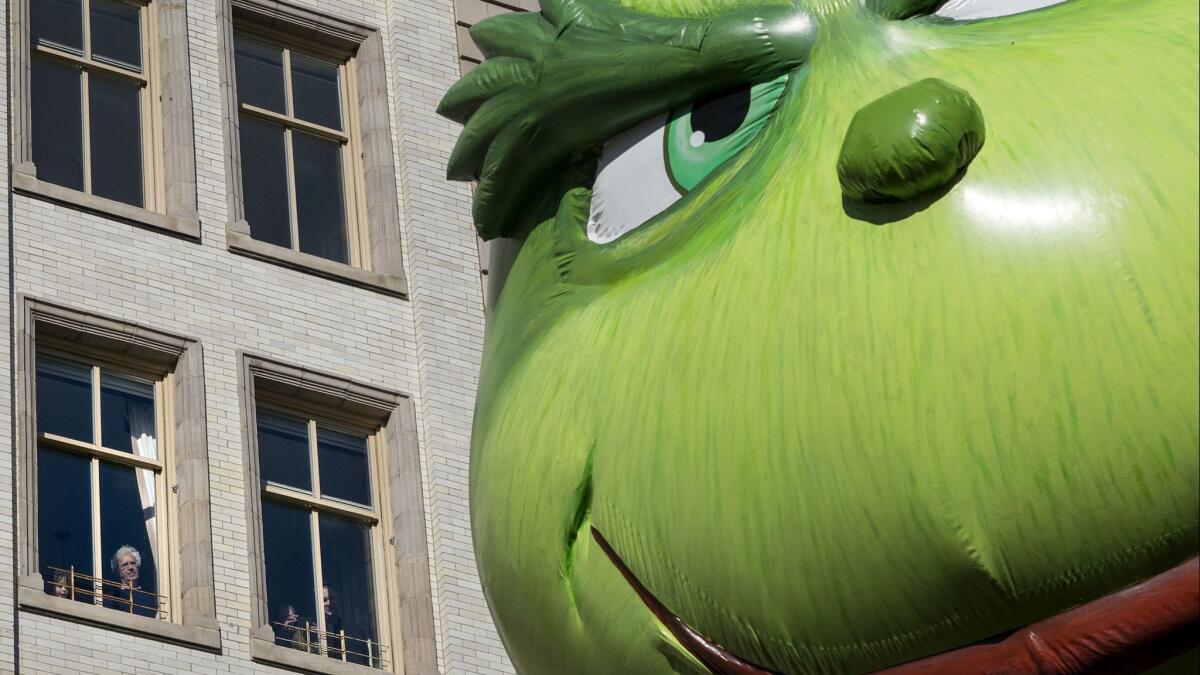Column: Thanksgiving doesn’t have a Grinch. Allow me to volunteer

- Share via
Thanksgiving has never had a Grinch, so I’ve thrown my hat into the ring. The holiday has an urgent problem. It’s definitional. The problem is “thank you” itself.
To be clear, I don’t mind political showdowns at the big dinner or the Saturday leftovers party. Knowing these battles are a nationwide cliche makes them feel patriotic. I also don’t mind turkey in any incarnation, and I actively like discussions of the matrilineal Wampanoag and the differences between Plymouth and Massachusetts Bay colonies.
No, my problem is with the act of thanksgiving. And I know that’s heresy. After all, we’re always being scolded by Oprah and other clergy for not giving thanks enough. If there’s one thing this broke-down nation seems to agree on, in fact, it’s that we’re a bunch of ingrates with a dire need for voluminous gratitude journals.
Maybe in the spirit of regressing around my family at the holidays, I’m just still the brat who didn’t thank my dad for doing my raking.
But “thank you,” those monotonous words, remains a compulsive tic — we offer it to people who show us baseline civility, who refrain from insulting us, who give us a hand when we’re washing their dirty dishes.
That’s not gratitude — that’s apologetics by another name. Thank you for letting me exist and serve you.
The campaign a few years ago against the saying of “I’m sorry,” especially for women, was a worthy one. Spearheaded by a commercial, “Sorry Not Sorry,” for Pantene, the shampoo company, that crusade asked that women stop apologizing like craven geishas and start having shinier hair.
Among the Pilgrims and Puritans, who similarly spearheaded official thanksgivings, contrition and atonement were big damn deals. Jonathan Edwards, the Puritan preacher, resolved to ask nightly “what sin I have committed” — and repent of it. But thinking “I’m sorry” to God as you’re drifting off is not quite parallel to stammering “I’m sorry” to the world for breathing air, so it’s still in the spirit of the Mayflower and religous nonconformity to skip the apology carpet bomb.
(You might also refuse to say “sorry” in tribute to another Puritan, feminist hero Hannah Duston, who was taken captive with her week-old baby in 1697. Her captors murdered the baby and marched Duston to a river island, where she turned the tables, killed her kidnappers, and brought home 10 of their scalps. Unapologetically.)
But while you’re not apologizing, consider also not saying thank you. Like “I’m sorry,” “thank you” is often an insincere tic, and even a mild gloat that serves as a way of closing out an encounter in which you come out marginally ahead.
Think of how “ta,” “TY” and the dreaded “k thanks bye” are ways of sealing down a conversation and getting the last word. Proper use of this kind of hate-thanks, in fact, is “I’m right and you’re wrong k thanks bye.” “Thank you,” this way, becomes almost obscene.
Worse still, because parents hammer at their kids to say it, the words are obviously culturally coerced.
“How sharper than a serpent’s tooth it is to have a thankless child!” my dad used to thunder, recalling King Lear, when I failed to thank him for driving me around or raking the leaves when it was my turn.
Sometimes for variety he’d exclaim: “Ingratitude, the vilest weed that grows!” Those words are uttered by the histrionic character James Tyrone in Eugene O’Neill’s “Long Day’s Journey Into Night.” When Tyrone says it to his son, his son replies, “I could see that line coming! God, how many thousand times —”
I felt the same way. To be fair, my dad was actually sending up the way overbearing fathers like Lear and Tyrone demand abject filial gratitude. While also, of course, aggressively reminding me to say thank you lest a vile weed bite us both with its serpent’s tooth.
But what is thanking someone?
Traditionally, the way to express formal gratitude was in writing, avoiding the phrase “thank you” entirely. Sending a thank-you note that reads, chiefly, “thank you” is almost ungratefulness itself. It universally means: I am completing a chore.
Enter the Fray: First takes on the news of the minute »
Instead you’re supposed to praise the gift or the experience. “The dinner the other night was one for the ages. Did you hear what Karen said about Matthew Whitaker? She’s a prophet. And I’ve never had spaghetti carbonara with Virginia ham! Sublime.”
See? No “thank you” at all! You might sound like an effusive freak, but at least you don’t sound like you’re paying your Verizon bill.
Football, defenses of Justice Brett M. Kavanaugh, sweet potatoes with marshmallows — I can bear it all. As long as I’m not asked to give a little spiel on what I’m grateful for.
Maybe in the spirit of regressing around my family at the holidays, I’m just still the brat who didn’t thank my dad for doing my raking. But somehow, the Gratitude Circle routine makes me — and my 9-year-old daughter — want to leave the family gathering for a nice, loving screen.
In the name of — feminism? rebellion? freedom of speech? — this year I told her that, at the first sign of a forced march into gratitude, we get to be Thanksgiving Grinches. In unison, we’ll say, “This was great, and you all are super. Kthanksbye.”
It’ll be worth it — even if we have to eat alone next year.
Twitter: @page88
More to Read
A cure for the common opinion
Get thought-provoking perspectives with our weekly newsletter.
You may occasionally receive promotional content from the Los Angeles Times.









